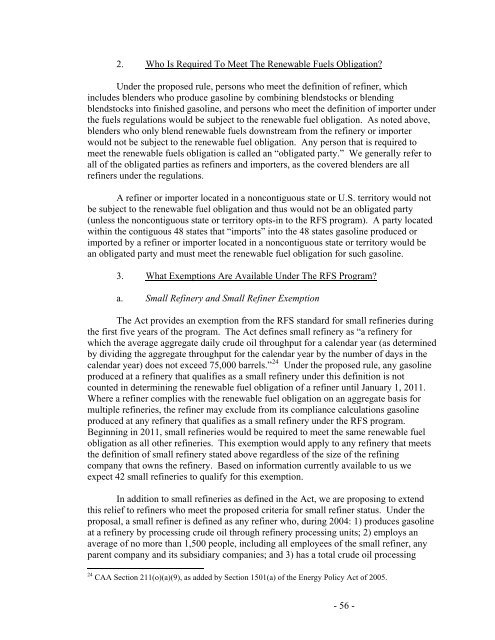Regulation of Fuels and Fuel Additives: Renewable Fuel Standard ...
Regulation of Fuels and Fuel Additives: Renewable Fuel Standard ...
Regulation of Fuels and Fuel Additives: Renewable Fuel Standard ...
Create successful ePaper yourself
Turn your PDF publications into a flip-book with our unique Google optimized e-Paper software.
2. Who Is Required To Meet The <strong>Renewable</strong> <strong><strong>Fuel</strong>s</strong> Obligation?<br />
Under the proposed rule, persons who meet the definition <strong>of</strong> refiner, which<br />
includes blenders who produce gasoline by combining blendstocks or blending<br />
blendstocks into finished gasoline, <strong>and</strong> persons who meet the definition <strong>of</strong> importer under<br />
the fuels regulations would be subject to the renewable fuel obligation. As noted above,<br />
blenders who only blend renewable fuels downstream from the refinery or importer<br />
would not be subject to the renewable fuel obligation. Any person that is required to<br />
meet the renewable fuels obligation is called an “obligated party.” We generally refer to<br />
all <strong>of</strong> the obligated parties as refiners <strong>and</strong> importers, as the covered blenders are all<br />
refiners under the regulations.<br />
A refiner or importer located in a noncontiguous state or U.S. territory would not<br />
be subject to the renewable fuel obligation <strong>and</strong> thus would not be an obligated party<br />
(unless the noncontiguous state or territory opts-in to the RFS program). A party located<br />
within the contiguous 48 states that “imports” into the 48 states gasoline produced or<br />
imported by a refiner or importer located in a noncontiguous state or territory would be<br />
an obligated party <strong>and</strong> must meet the renewable fuel obligation for such gasoline.<br />
3. What Exemptions Are Available Under The RFS Program?<br />
a. Small Refinery <strong>and</strong> Small Refiner Exemption<br />
The Act provides an exemption from the RFS st<strong>and</strong>ard for small refineries during<br />
the first five years <strong>of</strong> the program. The Act defines small refinery as “a refinery for<br />
which the average aggregate daily crude oil throughput for a calendar year (as determined<br />
by dividing the aggregate throughput for the calendar year by the number <strong>of</strong> days in the<br />
calendar year) does not exceed 75,000 barrels.” 24 Under the proposed rule, any gasoline<br />
produced at a refinery that qualifies as a small refinery under this definition is not<br />
counted in determining the renewable fuel obligation <strong>of</strong> a refiner until January 1, 2011.<br />
Where a refiner complies with the renewable fuel obligation on an aggregate basis for<br />
multiple refineries, the refiner may exclude from its compliance calculations gasoline<br />
produced at any refinery that qualifies as a small refinery under the RFS program.<br />
Beginning in 2011, small refineries would be required to meet the same renewable fuel<br />
obligation as all other refineries. This exemption would apply to any refinery that meets<br />
the definition <strong>of</strong> small refinery stated above regardless <strong>of</strong> the size <strong>of</strong> the refining<br />
company that owns the refinery. Based on information currently available to us we<br />
expect 42 small refineries to qualify for this exemption.<br />
In addition to small refineries as defined in the Act, we are proposing to extend<br />
this relief to refiners who meet the proposed criteria for small refiner status. Under the<br />
proposal, a small refiner is defined as any refiner who, during 2004: 1) produces gasoline<br />
at a refinery by processing crude oil through refinery processing units; 2) employs an<br />
average <strong>of</strong> no more than 1,500 people, including all employees <strong>of</strong> the small refiner, any<br />
parent company <strong>and</strong> its subsidiary companies; <strong>and</strong> 3) has a total crude oil processing<br />
24 CAA Section 211(o)(a)(9), as added by Section 1501(a) <strong>of</strong> the Energy Policy Act <strong>of</strong> 2005.<br />
- 56 -
















